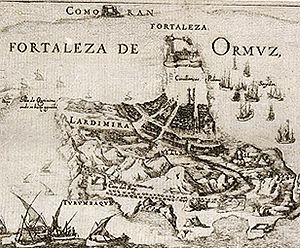Capture of Ormuz (1507)
| Capture of Ormuz | |||||||
|---|---|---|---|---|---|---|---|
| Part of Persia–Portugal war | |||||||
 The city and fortress of Ormuz, 17th century |
|||||||
|
|||||||
| Belligerents | |||||||
|
|
Kingdom of Ormus |
||||||
| Commanders and leaders | |||||||
| Afonso de Albuquerque |
|
||||||
| Strength | |||||||
| 460 men 7 ships |
Around 1,200 men | ||||||
The Capture of Ormuz in 1507 occurred when the Portuguese Afonso de Albuquerque attacked Hormuz Island to establish the Castle of Ormuz. This conquest gave the Portuguese full control of the trade between India and Europe passing through the Persian Gulf.
The capture of Ormuz was a result of a plan by the King of Portugal, Manuel I, who in 1505 had resolved to thwart Muslim trade in the Indian Ocean by capturing Aden to block trade through Alexandria; Ormuz, to block trade through Beirut; and Malacca to control trade with China. A fleet under Tristão da Cunha was sent to capture the Muslim fort on Socotra in order to control the entrance to the Red Sea; this was accomplished in 1507. The main part of the fleet then left for India, with a few ships remaining under Albuquerque.
Albuquerque disobeyed orders and left to capture the island of Ormuz. He obtained the submission of the local king to the king of Portugal, as well as the authorisation to build a fort using local labour. He started to build a fort on 27 October 1507, and initially planned to man it with a garrison, but could not hold it because of local resistance and the defection to India of several of his Portuguese captains.
With the support of the sovereign of Ormuz, the rebellious captains fought the forces of Albuquerque in early January 1508. After a few days of battle, Albuquerque was forced to withdraw from the city, abandoning the fort under construction. He sailed away in April 1508 with the two remaining ships. He returned to Socotra where he found the Portuguese garrison starving. He remained in the Gulf of Aden to raid Muslim ships, and attacked and burnt the city of Kālhāt (Calayate). He again returned to Ormuz, and then set sail to India on board a merchant ship he had captured.
...
Wikipedia
